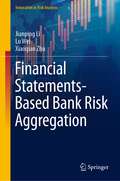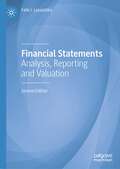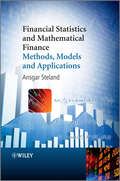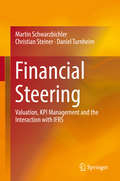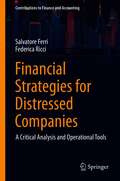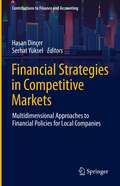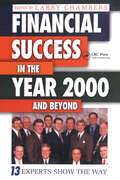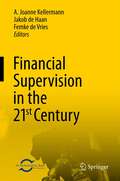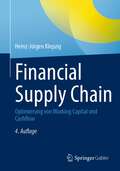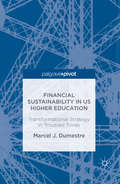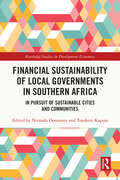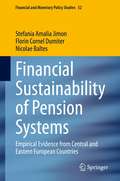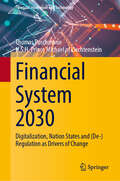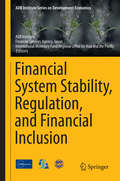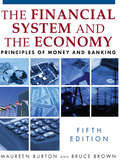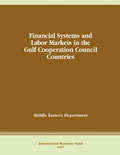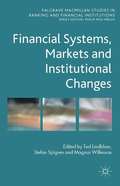- Table View
- List View
Financial Statements-Based Bank Risk Aggregation (Innovation in Risk Analysis)
by Jianping Li Lu Wei Xiaoqian ZhuThis book proposes a bank risk aggregation framework based on financial statements. Specifically, bank risk aggregation is of great importance to maintain stable operation of banking industry and prevent financial crisis. A major obstacle to bank risk management is the problem of data shortage, which makes many quantitative risk aggregation approaches typically fail. Recently, to overcome the problem of inaccurate total risk results caused by the shortage of risk data, some researchers have proposed a series of financial statements-based bank risk aggregation approaches. However, the existing studies have drawbacks of low frequency and time lag of financial statements data and usually ignore off-balance sheet business risk in bank risk aggregation. Thus, by reviewing the research progress in bank risk aggregation based on financial statements and improving the drawbacks of existing methods, this book proposes a bank risk aggregation framework based on financial statements. It makes full use of information recorded in financial statements, including income statement, on- and off-balance sheet assets, and textual risk disclosures, which solves the problem of data shortage in bank risk aggregation to some extent and improves the reliability and rationality of bank risk aggregation results. This book not only improves the theoretical studies of bank risk aggregation, but also provides an important support for the capital allocation of the banking industry in practice. Thus, this book has theoretical and practical importance for bank managers and researchers of bank risk management.
Financial Statements: Analysis And Reporting
by Felix I. LessamboThrough a mixture of concepts and examples, this book demystifies the variety of elements of financial accounting and uncovers the need-to-know information for certification in this field. This book covers the two aspects of financial statement analysis, namely quantitative and non-quantitative analysis. Concluding with helpful case studies, the book will appeal to students and academics of financial accounting.
Financial Statements: Analysis, Reporting and Valuation
by Felix I. LessamboThrough a mixture of concepts and examples, the second edition of this book demystifies the variety of elements of financial accounting and uncovers the need-to-know information for certification in this field. This book covers the two aspects of financial statement analysis, namely quantitative and non-quantitative analysis. Unique to the second edition, the book will also cover Non-GAA- metrics and valuation accounting. Concluding with helpful and updated case studies, the book will appeal to students and academics of financial accounting.
Financial Statements: The Elements of Managerial Finance
by Harvard Business School PressFinancial statements are the essential documents of business. This chapter helps you understand the three essential financial statements: the balance sheet, the income statement, and the cash flow statement. The chapter also elucidates some of the managerial issues implicit in using these statements and broadens your financial know-how through a discussion of two key concepts: financial leverage and the financial structure of the firm.
Financial Statistics and Mathematical Finance: Methods, Models and Applications
by Ansgar StelandMathematical finance has grown into a huge area of research which requires a lot of care and a large number of sophisticated mathematical tools. Mathematically rigorous and yet accessible to advanced level practitioners and mathematicians alike, it considers various aspects of the application of statistical methods in finance and illustrates some of the many ways that statistical tools are used in financial applications.Financial Statistics and Mathematical Finance:Provides an introduction to the basics of financial statistics and mathematical finance.Explains the use and importance of statistical methods in econometrics and financial engineering.Illustrates the importance of derivatives and calculus to aid understanding in methods and results.Looks at advanced topics such as martingale theory, stochastic processes and stochastic integration.Features examples throughout to illustrate applications in mathematical and statistical finance.Is supported by an accompanying website featuring R code and data sets.Financial Statistics and Mathematical Finance introduces the financial methodology and the relevant mathematical tools in a style that is both mathematically rigorous and yet accessible to advanced level practitioners and mathematicians alike, both graduate students and researchers in statistics, finance, econometrics and business administration will benefit from this book.
Financial Steering: Valuation, KPI Management and the Interaction with IFRS
by Martin Schwarzbichler Christian Steiner Daniel TurnheimThis book is a guide to how financial steering is designed, measured and implemented with a special focus on the energy industry. The authors offer an overview of and practical insights into the links between financial steering and accounting, and the temporary cycles of investment, divestment, return and loss, market highs and lows that form the framework of the entire energy industry across all value chain stages. The faster and the larger the cash cycles of investments and their returns, the greater not only the value created, but also the potential loss if the financial steering is not properly designed and managed. Value and value generation require an understanding of how value is both defined and measured in both and how the business/project economics model of a company works – financial steering provides this. Further, the book also discusses accounting topics such as impairments, new IFRS standards and the impact of accounting on key performance indicators of financial steering, which are associated with these investment decision valuations. The combination of accounting with the cash flow perspective provides a complete understanding of selected practical topics of financial steering which are explained in detail in a large number of examples and case studies. The book is intended for a wide range of finance/controlling/treasury/accounting professionals and students. It is written in practical and simple terms to outline the financial steering concept and to bring it to life in daily work and in the decision making process for financial steering. All illustrated concepts are in the same manner relevant and applicable to all other asset-intense industry sectors and their financial steering processes.
Financial Strategies for Distressed Companies: A Critical Analysis and Operational Tools (Contributions to Finance and Accounting)
by Salvatore Ferri Federica RicciThe financial markets have undergone a significant development process, both qualitatively and quantitatively, and partly induced by major pushes for globalization and deregulation. In this context, finance has taken on an increasingly central role for companies and is now on par with production and sales, which have always been the cornerstones of business management. The effects of these structural and functional changes are not limited to the way companies operate, but also imply a change in corporate cultures; one consequence of this phenomenon is the large percentage of managers from the world of finance at the top tiers of corporate organizations. Moreover, environmental turbulence has forced companies to increasingly face negative situations characterized by economic and financial imbalances that may require far-reaching strategic changes. The purpose of this book, therefore, is to investigate the possible financial strategies that companies in distress can adopt; in this regard, it approaches financial strategies as opportunities to resolve and prevent difficult situations for the company. After having systematized the financial strategies and policies used in the governance of companies, the book analyzes both crises and turnaround processes, describing the path until the financial balance is restored. Finally, the authors analyze essential tools for the financial management of companies in trouble, focusing in particular on operational tools for managing the crisis, the recovery plan, and its monitoring.
Financial Strategies for Today's Widow
by David W. LatkoA successful financial counselor with twenty-five years' experience empowers widows to manage their finances and attain lifelong securityIn many cases, losing a husband also means losing a financial partner. Suddenly, a widow is faced with essential decisions that she must consider single-handedly. With Financial Strategies for Today's Widow, David W. Latko, whose financial seminars have been attended by more than ten thousand people, answers every question a widow may have -- whether she is old, young, or in between -- and guides her out of any money problem. His advice is matter-of-fact, yet reassuring and uniquely tailored to every step of a widow's financial life including how to: Understand the choices that come with reorganizing one's finances Make sure there will always be enough Know what your assets are and how to access them Choose the right insurance Choose a financial advisorUser-friendly and replete with real-life stories of those who have benefited from the advice Latko offers here, Financial Strategies for Today's Widow takes readers through potential pitfalls and problems and lays out specific strategies for handling common economic hurdles.
Financial Strategies in Competitive Markets: Multidimensional Approaches to Financial Policies for Local Companies (Contributions to Finance and Accounting)
by Hasan Dinçer Serhat YükselAs globalization continues to rapidly evolve, economic borders between countries have practically disappeared. One effect is that nowadays companies can access new markets by investing in other countries. This offers an important advantage especially for international and large-scale companies. However, one result is the increased market competition. Small-scale local firms and SMEs have to compete with international firms and corporations that have significantly more resources. This competitive environment jeopardizes the sustainability of the smaller companies, which often are driven out of business by the more powerful global players. This book discusses financial strategies for small and middle size companies to increase their competitiveness in the global markets.
Financial Strategy for Higher Education: A Field Guide for Presidents, CFOs, and Boards of Trustees
by Michael K. TownsleyEconomic forces continue to reshape higher education, and the leaders of colleges and universities are not getting the guidance they need to achieve their financial goals. Michael K. Townsley, PhD, a seasoned higher education executive, shares proven principles, strategies, and techniques to manage the increasing pace of change in higher education in this field guide. Based on case studies, his own experiences, and insights from other experts, he provides strategic guidance on how to: effectively manage finances, allocate financial resources, design sophisticated budget forecasts, set tuition rates in competitive markets, control operational costs, and run online programs. With clearly ordered lists, logically sequenced plans for action, and cogently presented summaries, Financial Strategy for Higher Education offers a vital reference for anyone who managing the financial condition of colleges and universities during financial stress.
Financial Structures and Regulation: A Comparison of Crises in the UK, USA and Italy
by Alessandro RoselliA survey of past financial crises, starting with the great banking collapses of the interwar period. The current turmoil has prompted a number of questions regarding both its origins and ways to avoid its repetition. The historical background and the evolving institutional framework of banking and financial systems are at the center of this book.
Financial Success in the Year 2000 and Beyond: 13 Experts Show the Way
by Larry ChambersToday's investor faces a much larger challenge than those of just ten years ago. The size and complexities of the financial marketplace create confusion. The Dow Jones industrial average has doubled in the past two and a half years, and 10,000 on the Dow is no longer a fantasy. Money keeps flooding into the market. The New York Stock Exchange daily trading volume is four times that of 1990.Financial Success in the Year 2000 and Beyond covers financial planning and asset management, the fastest growing segments of the financial services industry. In the old days, highly commissioned salesmen would simply tell their clients what products to buy. Today, there are infinitely more choices and investments options to sort through and be concerned about. Technology has put complex investing tools into the hands of ordinary people, without good advice on how to use them. Never have so many people experienced so much control over their financial futures, yet felt a need for so much help. Applying lessons learned from past mistakes is hard and discouraging. Most people become investors without the wisdom of experience, getting the tests without first getting the lessons.Financial Success in the Year 2000 and Beyond explores virtually every aspect of financial planning and dispels many of the myths and mysteries surrounding investing and investments.The Experts include: Dennis R. Fletcher, CLU, ChFC, Oshkosh, WI , Joseph D. Longo, CLU, CFP, LUTCF, LIC, Troy, MI, Tom Nohr, CFP, RFC, Castro Valley, CA, Floyd L. Shilanski, Anchorage, AK, Robert Lyndon Taylor, LUTCF, Oklahoma City, OK, Michael P. Eischen, Columbus, OH, Lance A. Pelky, San Diego, CA, David W. Shepherd, RHU, ChFC , Tucson, AZ, Terry A. Vrieze, Des Moines, Iowa, Larry Rosenthal, RFC, LUTCF, Manassas, VA, William J. (Bill) Nelson, RFC, Cayton, OH, David S. White, Durham, NC, Mark Young, St Lewis, MO
Financial Supervision in the 21st Century
by Jakob De Haan A. Joanne Kellermann Femke De VriesThe financial crisis prompted financial supervisors to take a critical look at their own performance. The "toolkit" available to supervisors is considerably more varied than it was a few years ago. Supervision has become more forward-looking, taking into account also soft controls, such as 'conduct and culture', corporate governance, and business models of financial institutions. This collection of essays discusses several significant changes in supervision methods and supervisory organisations and examines what methods contribute to 'good supervision' and what can reasonably be expected of supervisors. The authors are experts in the field and most of them are affiliated to organisations responsible for financial supervision.
Financial Supervisory Independence and Accountability-Exploring the Determinants
by Marc Quintyn Donato Masciandaro Michael TaylorA report from the International Monetary Fund.
Financial Supply Chain: Optimierung von Working Capital und Cashflow
by Heinz-Jürgen KlepzigUnternehmensprozesse müssen ausreichend Cash generieren, sonst ist das Unternehmen betriebswirtschaftlich nicht in Balance und schnell in seiner Existenz gefährdet. Die Prozessgestaltung wird jedoch in vielen Unternehmen zu wenig monetär bewertet und betriebswirtschaftlich hinterfragt. Es gilt, diese Finanzströme – von der Kreditwürdigkeitsprüfung bis zum Zahlungseingang – zu optimieren und den Cash-to-Cash-Cycle zu beschleunigen. Im Rahmen des Working Capital-Managements ist das Freisetzen von im Working Capital gebundener Liquidität in den derzeitigen turbulenten VUCA-Zeiten zu einem der Top-Themen von Führungskräften geworden. Dieses Buch zeigt praxisorientiert vor dem Hintergrund aktueller Lieferkettenprobleme sowie Kaufzurückhaltung der Kunden, wie Unternehmen ihre Zukunftsfähigkeit durch aktives Working Capital-Management und Optimierung des Cashflows sichern können.Für die 4., erweiterte und überarbeitete Auflage wurden die Themen Supply Chain Financing, Lieferkettengestaltung und Liquiditätsbetrachtung im Rahmen von Cashflow-Rechnungen mit aufgenommen. Zwei neue Kapitel widmen sich den Themen Risikomanagement und Resilienz sowie Digitalisierung der Supply Chain.Der InhaltWirkung und Relevanz von Working CapitalVerbesserung der Financial Supply Chain durch ProzessmanagementKonzepte zu Working Capital-Analyse und -ManagementKPIs und Cashflow-RechnungHandlungsleitlinien im Risikofall
Financial Sustainability in Public Administration
by Manuel Pedro Rodríguez BolívarThis book analyses the methods used to assess financial sustainability as defined by the International Federation of Accountants (IFAC). Recently, there have been calls to consider sustainability as a fundamental guiding principle in public management. The financial and economic crisis has spurred a demand for greater financial sustainability in public administrations. Although the concept of sustainability has been traditionally associated with three dimensions (environmental, social and economic), this book is focuses on the metrics used to evaluate financial sustainability and explores the concept of financial health. It will be of interest to researchers and academics in the field of financial sustainability.
Financial Sustainability in US Higher Education
by Marcel J. DumestreThis book is a practical approach to insuring financial sustainability of US colleges, presented through the lens of organizational strategic thinking. The book does not simply offer models of how colleges can become financially sustainable in cost cutting, online education, international student recruiting, etc. Rather, it presents a succinct historical perspective of how foundational problems emerged, how some universities transformed themselves, and introduces an organizational strategic thinking process that can be used to develop unique solutions for almost any institution.
Financial Sustainability of Local Governments in Southern Africa: In Pursuit of Sustainable Cities and Communities (Routledge Studies in Development Economics)
by Nirmala Dorasamy Tonderai KapesaThis book delves into the critical issue of ensuring the long-term financial viability of local governments in the diverse region of Southern Africa. Across Southern Africa, cities and communities are facing a multitude of challenges, from rapid urbanization and infrastructure challenges to social inequality and environmental degradation. In this thought-provoking book, the authors explore the intricate relationship between financial sustainability and the pursuit of sustainable cities and communities through different lenses.Drawing on extensive research and case studies from various countries in the region, this book provides a comprehensive analysis of the financial realities faced by local governments. It examines the factors influencing revenue generation, expenditure management, and fiscal governance, shedding light on the complexities of financial decision-making in the context of limited resources and pressing development needs. Furthermore, it offers practical insights and actionable recommendations for policymakers, practitioners, and academics. It explores innovative approaches to revenue diversification, efficient expenditure allocation, and effective fiscal management, with the ultimate aim of fostering sustainable development, social services delivery, and environmentally sustainable infrastructure in Southern African cities and communities.This is an essential resource for anyone interested in understanding the challenges and opportunities associated with financial sustainability in the context of urbanisation and sustainable development in greater Africa. It serves as a guide and inspiration for building financially resilient local governments that can support the aspirations and well-being of their citizens while contributing to the broader vision of sustainable cities and communities.
Financial Sustainability of Pension Systems: Empirical Evidence from Central and Eastern European Countries (Financial and Monetary Policy Studies #52)
by Stefania Amalia Jimon Florin Cornel Dumiter Nicolae BaltesThe sustainability of public pension systems has become an important aspect for governments and institutions worldwide. This book addresses the multiple elements that influence the sustainability of pension systems with a special focus on central and eastern European countries. Supported by the results of econometric empirical studies, the authors discuss and analyse areas like social economy versus capitalist economy, globalization versus glocalization, population aging versus birth and fertility, emigration versus immigration, early retirement versus prolongation versus professional activity, the sustainability of public pension systems versus the adequacy of benefits provided, public pension systems compared to private pension funds and taxation of salary incomes versus subsidization of state social insurance.
Financial System 2030: Digitalization, Nation States and (De-)Regulation as Drivers of Change (Financial Innovation and Technology)
by Thomas Puschmann H.S.H. Prince of LiechtensteinThe financial system is currently confronted with tremendous challenges from the global economy, trade, politics, demographics, and most recently from enormous technological advancements. These developments have the capacity to change the existing financial system fundamentally. This book addresses how technological developments and digitalization will impact the future of financial systems. This book is based on the results of a series of ten roundtables with high-level experts on the future of the financial system. Experts from academia, supranational institutions, central banks, commercial banks, regulators, start-ups, technology companies, venture capital firms, think tanks, foundations, and other visionaries from five continents developed potential scenarios of the financial system 2030 over a time horizon of five years. The book presents the results of these discussions, which are structured along the ‘Vaduz Architecture’. This newly introduced concept distinguishes different dimensions for the future financial system, including information technologies, nation states and (de-) regulation.
Financial System Stability, Regulation, and Financial Inclusion
by International Monetary Fund Staff Springer Fachmedien Wiesbaden Staff ADB Institute Staff Financial Services Agency EditorsFinancial authorities face a number of key challenges, including maintaining financial stability; ensuring long-term finance for stable economic growth; promoting greater access to financial services for both households and small and medium-sized enterprises (SMEs); and fostering a competitive financial industry. Access to finance for SMEs is particularly important, given their large shares in economic activity and employment in Asian economies. Striking the appropriate balance in achieving these objectives through financial supervision and regulation is an important policy issue for financial regulators. This book is the record of a joint conference in 2014 organized by the Asian Development Bank Institute; Financial Services Agency, Japan; and International Monetary Fund Regional Office for Asia and the Pacific on the topic of financial system stability, regulation, and financial inclusion. Participants included noted scholars, policymakers, and financial industrial participants from Asia. ADB Institute The ADB Institute, located in Tokyo, is the think tank of the Asian Development Bank. Its mission is to identify effective development strategies and improve development management in ADB's developing member countries. Financial Services Agency, Japan The Financial Services Agency, Japan is responsible for ensuring the stability of Japan's financial system, the protection of depositors, insurance policyholders and securities investors, and smooth finance through such measures as planning and policymaking. International Monetary Fund Regional Office for Asia and the Pacific The International Monetary Fund Regional Office for Asia and the Pacific contributes to economic surveillance and research, leads the IMF's involvement in regional cooperation, manages regional capacity building programs, and promotes the understanding and two-way dialogue of the IMF in the region.
Financial System of the Economy: Principles of Money and Banking
by Bruce Brown Maureen BurtonAttempts to assess whether the United States is in economic decline. Appropriate to general readers as well as economics students and scholars, this book examines the fears of Americans about their economic future.
Financial Systems and Labor Markets in the Gulf Cooperation Council Countries
by International Monetary FundA report from the International Monetary Fund.
Financial Systems in Troubled Waters: Information, Strategies, and Governance to Enhance Performances in Risky Times (Routledge International Studies in Money and Banking #73)
by Alessandro Carretta Gianluca MattarocciThis collection considers the financial crisis from a managerial perspective, focussing on the business implications for the financial industry. Topics examined include governance, information needs and strategy of financial intermediaries and investors. The contributions build on the existing literature and present some unique insights on governance, credit quality evaluation and performance measurement. In a fast growing or steady market, it is possible for even an inefficient financial system to satisfy investors’ and firms’ needs. However, the current financial crisis has brought into sharp relief the limits of the inefficient practices adopted by the market, and made clear the importance of developing more effective governance mechanisms, more detailed and complete information databases and new strategies. The crisis has also brought to the fore issues about the governance of financial intermediaries that had not been previously addressed. These include board diversity, internal monitoring procedures and the existence of interlocking directorates. More broadly, the financial crisis has radically altered the international framework, with an increasingly consolidated financial sector, and the rise of new markets (such as China) that now play a predominant role in the worldwide market. Studies on the competition and on the performance in this new scenario are essential in order to understand the implications of recent events.
Financial Systems, Markets And Institutional Changes
by Stefan Sjögren Ted Lindblom Magnus WillessonFinancial Systems, Markets and Institutional Changes analyses and exemplifies how the financial system endogenously adjusts to institutional changes such as new technology, political tendencies, cultural differences, new business models, and government interactions. It puts particular emphasis on how different institutional settings affect firms' borrowing and how the financial crisis affected the relationship between borrowing firms and lending banks. It further increases our understanding of how efficient financial markets are formed, by addressing issues related to the globalization of the financial market, questioning whether the EMU, with its regional imbalances, is an optimal currency union, and putting new requirements on an international lender of last resort. Recent technology developments, with high frequency trading, and the increased existence of Islamic banking are two further examples of institutional changes that form new actors and new markets.
